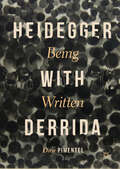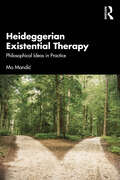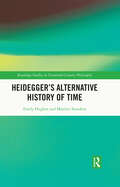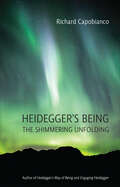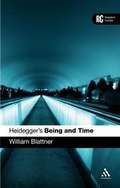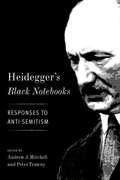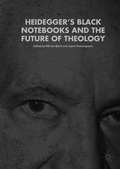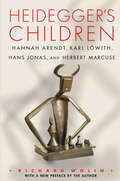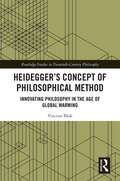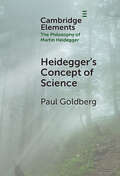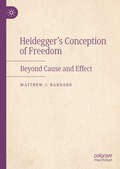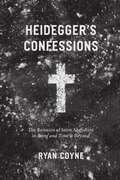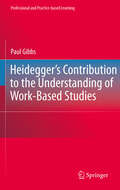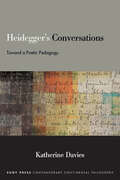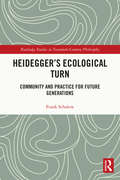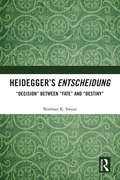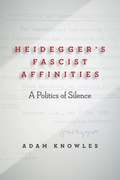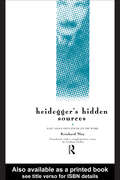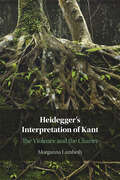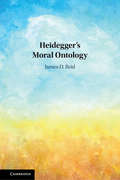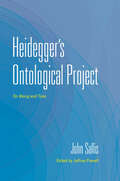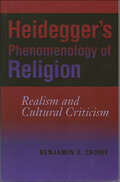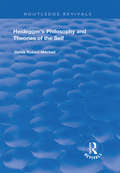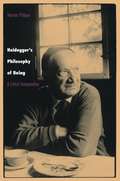- Table View
- List View
Heidegger, Translation, and the Task of Thinking
by F. SchalowNumerous volumes have been written on the philosophy of Martin Heidegger, and new translations of his writings appear on a regular basis. Up to now, however, no book has addressed the connections between Heidegger's thought and the hermeneutic methodology involved in translating his works - or any other text. Gathering essays by internationally recognized scholars, this volume examines the specific synergy that holds between Heidegger's thinking and the distinctive endeavor of translation. Heidegger, Translation, and the Task of Thinking: Essays in Honor of Parvis Emad offers scholars and students alike a rare journey into the insights and intricacies of one of the greatest philosophers of the twentieth century. The book also pays homage to Parvis Emad, Professor Emeritus of Philosophy at De Paul University, founder of the journal Heidegger Studies and a renowned translator of Heidegger's writings. Heidegger, Translation, and the Task of Thinking: Essays in Honor of Parvis Emad provides a uniquely focused perspective on Heidegger's thought, and delves into the strategies and controversies that attend all attempts to translate his most complex and challenging texts, including his seminal works Contributions to Philosophy and Mindfulness. Accordingly, this book will be of great interest and benefit to anyone working in the fields of phenomenology, hermeneutics, or Heidegger studies.
Heidegger with Derrida: Being Written
by Dror PimentelHeidegger with Derrida: Being Written attempts, for the first time, to think Heidegger's philosophy through the lens of Derrida's logocentric thesis, according to which speech has, throughout the history of metaphysics, been given primacy over writing. The book offers a detailed account of Derrida's arguments about the debasement of writing, an account that leads to a new definition of writing, conceiving it epistemically, rather than linguistically. Heidegger's analysis of the gaze and critique of the modern subject are shown to have logocentric features. This surprising conclusion entails that Heidegger is well within the metaphysical tradition, which he labored so intently to overcome. The book sheds new light on the philosophical roots of Heidegger’s involvement with Nazism, arguing that his hierarchical thinking--the hallmark of logocentrism and metaphysics—condones violent differentiation between the ‘proper’ race and the Other.
Heideggerian Existential Therapy: Philosophical Ideas in Practice
by Mo MandićHeideggerian Existential Therapy focuses on Martin Heidegger’s philosophy in order to provide both a wider accessibility as well as understanding of its relevance to therapeutic practice. This book unveils in great depth the core tenets of Heidegger’s thinking, without presuming any philosophical background. It attends to the manner in which we inevitably undergo disruptions, disturbances, perturbations, breakdowns, and collapses in the course of our lives, and on the way in which they can be addressed and understood from an existential therapeutic perspective. The text covers Heidegger’s ideas with illustrations and examples, in order to free them from the confines of philosophy in a way that then enables them to be brought directly into the therapy room. Each chapter takes the reader from an initial philosophical grounding of this approach towards a clear and concrete way of working existentially with clients. The text is primarily intended for trainee and practising psychotherapists, but will undoubtedly be of considerable relevance and interest to coaches, consultants, and trainers who wish to expand and deepen their skills and approaches in their own fields.
Heidegger’s Alternative History of Time (Routledge Studies in Twentieth-Century Philosophy)
by Emily Hughes Marilyn StenderaThis book reconstructs Heidegger’s philosophy of time by reading his work with and against a series of key interlocutors that he nominates as being central to his own critical history of time. In doing so, it explains what makes time of such significance for Heidegger and argues that Heidegger can contribute to contemporary debates in the philosophy of time.Time is a central concern for Heidegger, yet his thinking on the subject is fragmented, making it difficult to grasp its depth, complexity, and promise. Heidegger traces out a history that focuses on the conceptualisations of time put forward by Aristotle, Plotinus, Augustine, Kant, Hegel, Bergson, and Husserl – an “alternative history of time” that challenges how time has been defined and studied within both philosophy and the sciences. This book explores what happens when we take seriously Heidegger’s claim that these seven figures are essential to any understanding of time, setting out what this can tell us about existence, possibility, and philosophy as a historical discipline.Heidegger’s Alternative History of Time will appeal to scholars and advanced students working on Heidegger, phenomenology, the philosophy of time, and the history of philosophy.
Heidegger’s Being: The Shimmering Unfolding (New Studies in Phenomenology and Hermeneutics)
by Richard CapobiancoIn Heidegger’s Being: The Shimmering Unfolding, the eminent Heidegger scholar Richard Capobianco draws on many new texts and sources to highlight in fresh ways the beauty and spiritual resonance of Martin Heidegger’s thinking about Being. As in his earlier books, Capobianco offers a meditative path through Heidegger’s thought. He illuminates major motifs that are overlooked or set aside by most contemporary readings of Heidegger, amplifying these motifs in an original, heartfelt, and eloquent way. The book also offers a series of reflections that bring Heidegger’s thinking into close proximity to other thinkers and poets, including Alfred North Whitehead, C.G. Jung, Robert Frost, Walt Whitman, and Rumi. Heidegger’s Being: The Shimmering Unfolding is intended not only for dedicated students of Heidegger’s work but also for engaged general readers who wish to come to a deeper appreciation of his distinctive vision of Being.
Heidegger's Being and Time (Reader's Guides)
by William Blattner<p>Continuum's Reader's Guides are clear, concise and accessible introductions to classic works of philosophy. Each book explores the major themes, historical and philosophical context and key passages of a major philosophical text, guiding the reader toward a thorough understanding of often demanding material. Ideal for undergraduate students, the guides provide an essential resource for anyone who needs to get to grips with a philosophical text. <p><i>Heidegger's Being and Time</i> is one of the most influential and controversial philosophical treatises of the 20th century. It had a profound impact on Sartre and Merleau-Ponty in their further development of phenomenology and existentialism, hugely influenced Gadamer's hermeneutics, and paved the way, partly directly and partly indirectly through Heidegger's later thought, for the emergence of deconstructionism. In addition to being a very important text, it is also a very difficult one. Heidegger presents a number of challenges to the the reader, asking them to abandon many assumptions fundamental to traditional philosophy, such as the mind/body distinction and the concept of substance. The text also introduces a whole host of new concepts and terms and as such is a hugely challenging, yet fascinating, piece of philosophical writing. <p>In <i>Heidegger's Being and Time: A Reader's Guide</i>, William Blattner explains the philosophical background against which the book was written and provides a clear and concise overview of the key themes and motifs. The book then examines this challenging text in details, guiding the reader to a clear understanding of Heidegger's work as a whole. Finally Blattner explores the reception and influence of the work and offers the student guidance on further reading. This is the ideal companion to study of this most influential and challenging of texts.
Heidegger's Black Notebooks: Responses to Anti-Semitism
by Edited by Andrew J. Mitchell Peter TrawnyFrom the 1930s through the 1970s, the philosopher Martin Heidegger kept a running series of private writings, the so-called Black Notebooks. The recent publication of the Black Notebooks volumes from the war years have sparked international controversy. While Heidegger’s engagement with National Socialism was well known, the Black Notebooks showed for the first time that this anti-Semitism was not merely a personal resentment. They contain not just anti-Semitic remarks, they show Heidegger incorporating basic tropes of anti-Semitism into his philosophical thinking. In them, Heidegger tried to assign a philosophical significance to anti-Semitism, with “the Jew” or “world Judaism” cast as antagonist in his project.How, then, are we to engage with a philosophy that, no matter how significant, seems contaminated by anti-Semitism? This book brings together an international group of scholars from a variety of disciplines to discuss the ramifications of the Black Notebooks for philosophy and the humanities at large. Bettina Bergo, Robert Bernasconi, Martin Gessmann, Sander Gilman, Peter E. Gordon, Hans Ulrich Gumbrecht, Michael Marder, Eduardo Mendieta, Richard Polt, Tom Rockmore, Peter Trawny, and Slavoj Žižek discuss issues including anti-Semitism in the Black Notebooks and Heidegger’s thought more broadly, such as German conceptions of Jews and Judaism, Heidegger’s notions of metaphysics, and anti-Semitism’s entanglement with Heidegger’s views on modernity and technology, grappling with material as provocative as it is deplorable. In contrast to both those who seek to exonerate Heidegger and those who simply condemn him, and rather than an all-or-nothing view of Heidegger’s anti-Semitism, they urge careful reading and rereading of his work to turn Heideggerian thought against itself. These measured and thoughtful responses to one of the major scandals in the history of philosophy unflinchingly take up the tangled and contested legacy of Heideggerian thought.
Heidegger’s Black Notebooks and the Future of Theology
by Mårten Björk Jayne SvenungssonThis book probes the relationship between Martin Heidegger and theology in light of the discovery of his Black Notebooks, which reveal that his privately held Antisemitism and anti-Christian sentiments were profoundly intertwined with his philosophical ideas. Heidegger himself was deeply influenced by both Catholic and Protestant theology. This prompts the question as to what extent Christian anti-Jewish motifs shaped Heidegger's own thinking in the first place. A second question concerns modern theology's intellectual indebtedness to Heidegger. In this volume, an array of renowned Heidegger scholars - both philosophers and theologians -investigate Heidegger's animosity toward the biblical legacy in both its Jewish and Christian interpretations, and what it means for the future task and identity of theology.
Heidegger's Children
by Richard WolinMartin Heidegger is perhaps the twentieth century's greatest philosopher, and his work stimulated much that is original and compelling in modern thought. A seductive classroom presence, he attracted Germany's brightest young intellects during the 1920s. Many were Jews, who ultimately would have to reconcile their philosophical and, often, personal commitments to Heidegger with his nefarious political views. In 1933, Heidegger cast his lot with National Socialism. He squelched the careers of Jewish students and denounced fellow professors whom he considered insufficiently radical. For years, he signed letters and opened lectures with ''Heil Hitler!'' He paid dues to the Nazi party until the bitter end. Equally problematic for his former students were his sordid efforts to make existential thought serviceable to Nazi ends and his failure to ever renounce these actions. This book explores how four of Heidegger's most influential Jewish students came to grips with his Nazi association and how it affected their thinking. Hannah Arendt, who was Heidegger's lover as well as his student, went on to become one of the century's greatest political thinkers. Karl Löwith returned to Germany in 1953 and quickly became one of its leading philosophers. Hans Jonas grew famous as Germany's premier philosopher of environmentalism. Herbert Marcuse gained celebrity as a Frankfurt School intellectual and mentor to the New Left. Why did these brilliant minds fail to see what was in Heidegger's heart and Germany's future? How would they, after the war, reappraise Germany's intellectual traditions? Could they salvage aspects of Heidegger's thought? Would their philosophy reflect or completely reject their early studies? Could these Heideggerians forgive, or even try to understand, the betrayal of the man they so admired? Heidegger's Children locates these paradoxes in the wider cruel irony that European Jews experienced their greatest calamity immediately following their fullest assimilation. And it finds in their responses answers to questions about the nature of existential disillusionment and the juncture between politics and ideas.
Heidegger’s Concept of Philosophical Method: Innovating Philosophy in the Age of Global Warming (Routledge Studies in Twentieth-Century Philosophy)
by Vincent BlokThis book provides new interpretations of Heidegger’s philosophical method in light of 20th-century postmodernism and 21st-century speculative realism. In doing so, it raises important questions about philosophical method in the age of global warming and climate change. Vincent Blok addresses topics that have yet to be extensively discussed in Heidegger scholarship, including Heidegger’s method of questioning, the religious character of Heidegger’s philosophical method, and Heidegger’s conceptualization of philosophical method as explorative confrontation. He is also critical of Heidegger’s conceptuality and develops a post-Heideggerian concept of philosophical method, which provides a new perspective on the role of willing, poetry, and earth-interest in contemporary philosophy. This earth-interest turns out to be particularly important to consider and leads to critical reflections on Heidegger’s concept of Earth, the necessity of Earth-interest in contemporary philosophy, and a post-Heideggerian concept of the Earth. Heidegger’s Concept of Philosophical Method will be of interest primarily to Heidegger scholars and graduate students, but its discussion of philosophical method and environmental philosophy will also appeal to scholars in other disciplines and areas of philosophy.
Heidegger's Concept of Science (Elements in the Philosophy of Martin Heidegger)
by Paul GoldbergThis Element argues that Heidegger's concept of science has two core features. Heidegger critiques a security-oriented concept of science, which he associates with the dominance of physics in modern science and metaphysics and with a progressive resistance among philosophers and scientists to ontological questioning. Meanwhile, Heidegger advances an access-oriented concept of science, on which science is essentially founded on ontological disclosures but also constantly open to the possibility of new revolutionary disclosures. This Element discusses how these commitments develop in Heidegger's early and later thinking, and argues that they inform his views on the history of Western metaphysics and on the possibilities for human flourishing that modernity, and modern science specifically, affords. The Element also discusses Heidegger's dialogue with Werner Heisenberg about quantum physics; and throughout, it highlights points of contact and divergence between Heidegger and other philosophers of science such as Karl Popper, Thomas Kuhn, Paul Feyerabend, and Helen Longino.
Heidegger’s Conception of Freedom: Beyond Cause and Effect
by Matthew J. BarnardThis book is the first monograph in English exclusively dedicated to the exegesis of Martin Heidegger’s radical conception of freedom which was developed in response to the human experience of existential guilt and mortality explained through the phenomena of transcendence and truth. The book is additionally distinctive in that it is the first to approach these issues with the purpose of clarifying the texts involved rather than constructing a novel conception of agency or freedom on the basis of those texts. Heidegger’s Conception of Freedom is ideal for scholars and researchers of philosophy and especially for those focusing on Heidegger's thought, existentialism and phenomenology.
Heidegger's Confessions: The Remains of Saint Augustine in "Being and Time" and Beyond (Religion And Postmodernism Ser.)
by Ryan CoyneAlthough Martin Heidegger is nearly as notorious as Friedrich Nietzsche for embracing the death of God, the philosopher himself acknowledged that Christianity accompanied him at every stage of his career. In Heidegger's Confessions, Ryan Coyne isolates a crucially important player in this story: Saint Augustine. Uncovering the significance of Saint Augustine in Heidegger’s philosophy, he details the complex and conflicted ways in which Heidegger paradoxically sought to define himself against the Christian tradition while at the same time making use of its resources. Coyne first examines the role of Augustine in Heidegger’s early period and the development of his magnum opus, Being and Time. He then goes on to show that Heidegger owed an abiding debt to Augustine even following his own rise as a secular philosopher, tracing his early encounters with theological texts through to his late thoughts and writings. Bringing a fresh and unexpected perspective to bear on Heidegger’s profoundly influential critique of modern metaphysics, Coyne traces a larger lineage between religious and theological discourse and continental philosophy.
Heidegger’s Contribution to the Understanding of Work-Based Studies
by Paul GibbsThis book seeks to develop the philosophy of Heidegger notion and reflects the growing importance of work based studies which is becoming of special interest to higher education institutions and commercial organisations. The author acknowledges the dominance of the economic discourse of higher education, but in this book he tries to argue that Heidegger offers a phenomenological approach to understanding the diversity to higher education that work based learning can bring. The book offers a structured argument for a phenomenological understanding of both the educational institution and the commercial environment to be considered as workplaces.
Heidegger's Conversations: Toward a Poetic Pedagogy (SUNY series in Contemporary Continental Philosophy)
by Katherine DaviesReading Martin Heidegger's five conversational texts together for the first time, Heidegger's Conversations elaborates not only what Heidegger thought but how he did so by attending to the philosophical possibilities of the genre of these under-studied texts written between 1944 and 1954. Though he wrote little on the topic of teaching and learning explicitly, Katherine Davies shows Heidegger performed an implicit poetic pedagogy in his conversations that remains to be recognized. Heidegger launched an experimental attempt to enact a learning of non-representational, non-metaphysical thinking by cultivating a distinctly collaborative sensitivity to the call of the poetic. Davies illustrates how each conversation emphasizes a particular pedagogical element—non-oppositionality, making mistakes, thinking in community, poetic interpretation, and the dangers of such pedagogy—which together constitute the developmental arc of these texts. Whether Heidegger is revising or reinforcing his own earlier pedagogical practices, Davies argues that attending to the dramatic staging of the conversations offers a distinct vantage point from which to contend with Heidegger's philosophy and politics in the post-war period.
Heidegger’s Ecological Turn: Community and Practice for Future Generations (Routledge Studies in Twentieth-Century Philosophy)
by Frank SchalowThis book makes explicit the ecological implications of Martin Heidegger. It examines how the trajectory of Heidegger’s thinking harbors an "ecological turn," which comes to the forefront in his attempt to anticipate the impending crisis precipitated by modern technology. Schalow’s emphasis on such key motifs as stewardship, dwelling, and "letting be" (Gelassenheit) serves to coalesce the problem of freedom in a new and innovative way, in order to expand the interpretive or hermeneutic horizon for re-examining Heidegger’s philosophy. By prioritizing a response to today’s environmental crisis and the possible impact upon future generations, the author traverses a divide within Heidegger scholarship by developing a deeper, critical outlook on his philosophy—without either reiterating standard interpretations or rejecting them wholesale. He develops a trans-human approach to ethics, which, by prioritizing the welfare of the earth, nature, and animals, counters the anthropocentric bias and destructive premise of modern technology. Heidegger’s Ecological Turn will be of interest to Heidegger scholars and researchers working in phenomenology, hermeneutics, continental philosophy, and environmental philosophy.
Heidegger’s Entscheidung: “Decision” Between “Fate” and “Destiny”
by Norman K. SwazoThis book critically examines the debate on Martin Heidegger’s concept of Entscheidung ("decision") and his engagement and confrontation with Nazism in terms of his broader philosophical thought. It argues that one cannot explain Heidegger’s actions without accounting for his idea of "decision" and its connection to his understanding of individual "fate" and national (and European) "destiny." The book looks at the relation of biography to philosophy and the ethical and political implications of appropriating Heidegger’s thinking in these domains of inquiry. It highlights themes such as Heidegger’s differences with the neo-Kantians in Germany; Heidegger on Kant and practical reason; and his reading of Nietzsche and Hegel. It offers a philosophical assessment grounded in Heidegger’s own texts, with reference to historical and other philosophical commentaries on the rise of National Socialism in post-Weimar Germany and the philosophical issues associated with the interpretation of Nazi genocide and ideology. An important intervention in Western philosophy, this book will be of great interest to scholars and researchers of political philosophy, continental philosophy, German philosophy, philosophy in general, and political studies.
Heidegger's Fascist Affinities: A Politics of Silence
by Adam KnowlesReexamining the case of one of the most famous intellectuals to embrace fascism, this book argues that Martin Heidegger's politics and philosophy of language emerge from a deep affinity for the ethno-nationalist and anti-Semitic politics of the Nazi movement. Himself a product of a conservative milieu, Heidegger did not have to significantly compromise his thinking to adapt it to National Socialism but only to intensify certain themes within it. Tracing the continuity of these themes in his lectures on Greek philosophy, his magnum opus, Being and Time, and the notorious Black Notebooks that have only begun to see the light of day, Heidegger's Fascist Affinities argues that if Heidegger was able to align himself so thoroughly with Nazism, it was partly because his philosophy was predicated upon fundamental forms of silencing and exclusion. With the arrival of the Nazi revolution, Heidegger displayed—both in public and in private—a complex, protracted form of silence drawn from his philosophy of language. Avoiding the easy satisfaction of banishing Heidegger from the philosophical realm so indebted to his work, Adam Knowles asks whether what drove Heidegger to Nazism in the first place might continue to haunt the discipline. In the context of today's burgeoning ethno-nationalist regimes, can contemporary philosophy ensure itself of its immunity?
Heidegger's Hidden Sources: East-Asian Influences on his Work
by Reinhard MayHeidegger's Hidden Sources documents for the first time Heidegger's remarkable debt to East Asian philosophy. In this groundbreaking study, Reinhard May shows conclusively that Martin Heidegger borrowed some of the major ideas of his philosophy - on occasion almost word for word - from German translations of Chinese Daoist and Zen Buddhist classics. The discovery of this astonishing appropriation of non-Western sources will have important consequences for future interpretations of Heidegger's work. Moreover, it shows Heidegger as a pioneer of comparative philosophy and transcultural thinking.
Heidegger's Interpretation of Kant: The Violence and the Charity
by Morganna LambethHeidegger has a reputation for reading himself into the philosophers he interprets, and his interpretation of Kant has therefore had little uptake in anglophone Kant scholarship. In this book, Morganna Lambeth provides a new account of Heidegger's method of interpreting Kant, arguing that it is more promising than is typically recognized. On her account, Heidegger thinks that Kant's greatest insights are located in moments of tension, where Kant struggles to articulate something new about his subject-matter. The role of the interpreter, then, is to disentangle competing strands of argument, and to determine which strand is most compelling. Lambeth traces Heidegger's interpretive method across his reading of Kant's Critique of Pure Reason and situates Heidegger's reconstruction of Kant's best line of argument against other post-Kantian readings. She finally shows how Heidegger's deep engagement with Kant sheds light on Heidegger's own philosophical views.
Heidegger's Moral Ontology
by James D. ReidHeidegger's Moral Ontology offers the first comprehensive account of the ethical issues that underwrite Heidegger's efforts to develop a novel account of human existence. Drawing from a wide array of source materials from the period leading up to the publication of Being and Time (1919–1927), and in conversation with ancient, modern, and contemporary contributions to moral philosophy, James D. Reid brings Heidegger's early philosophy into fruitful dialogue with the history of ethics, and sheds fresh light on such familiar topics as Heidegger's critique of Husserl, his engagement with Aristotle, his account of mortality, the role played by Kant in the genesis of Being and Time, and Heidegger's early reflections on philosophical language and concepts. This lively book will appeal to all who are interested in Heidegger's early phenomenology and in his thought more generally, as well as to those interested in the nature, scope, and foundations of ethical life.
Heidegger's Ontological Project: On <i>Being and Time</i> (The Collected Writings of John Sallis)
by John SallisThis long-awaited volume of The Collected Writings of John Sallis presents his lectures on Martin Heidegger's monumental Being and Time.The lectures were presented during the 1985–86 academic year at Loyola University of Chicago and during the fall semester of 1999 at Pennsylvania State University. The fourteen years separating the beginning of the two courses is significant in that numerous additional volumes appeared in the Gesamtausgabe and influenced Sallis's interpretation of Being and Time.This book is a synthesis of the manuscripts of the two separate lecture courses. This volume makes Being and Time accessible to students, while the most advanced scholars will also profit from it.
Heidegger's Phenomenology of Religion: Realism and Cultural Criticism (Philosophy of Religion)
by Benjamin D. CroweThroughout his long and controversial career, Martin Heidegger developed a substantial contribution to the phenomenology of religion. In Heidegger's Phenomenology of Religion, Benjamin D. Crowe examines the key concepts and developmental phases that characterized Heidegger's work. Crowe shows that Heidegger's account of the meaning and structure of religious life belongs to his larger project of exposing and criticizing the fundamental assumptions of late modern culture. He reveals Heidegger as a realist through careful readings of his views on religious attitudes and activities. Crowe challenges interpretations of Heidegger's early efforts in the phenomenology of religion and later writings on religion, including discussions of Greek religion and Hölderlin's poetry. This book is sure to spark discussion and debate as Heidegger's work in religion and the philosophy of religion becomes increasingly important to scholars and beyond.
Heidegger's Philosophy and Theories of the Self (Routledge Revivals Ser.)
by Derek Robert MitchellThis title was first published in 2001. Explaining and defending a Heideggarian account of the self and our knowledge of the world, this book addresses the fundamental issues of selfhood and the elemental question of what it means to be human. The author vcritically examines theories of the self derived from two distinct schools of thought: Descartes, Hume, Kant, Sartre and Stirner representing a tradition which has dominated Western philosophy since Descartes; Heidegger and Laing representing a radical departure from the tradition. The author focuses on two key philosophical problems throughout: the problem of knowledge and the problem of identity. The author argues that ultimately Heidegger does no more than echo Stirner's empty egoism and provides a bleak, inescapable heroism for the individual.
Heidegger's Philosophy of Being: A Critical Interpretation
by Herman PhilipseThis scrupulously researched and rigorously argued book is the first to interpret and evaluate the central topic of Martin Heidegger's philosophy--his celebrated "Question of Being"--in the context of the full range of Heidegger's thought. With this comprehensive approach, Herman Philipse distinguishes in unprecedented ways the center from the periphery, the essential from the incidental in Heidegger's philosophy. Among other achievements, this allows him to shed new light on the controversial relationship between Heidegger's life and thought--in particular the connections between his philosophy and his involvement with Nazism.Philipse begins by explaining which problems an interpretation of Heidegger's question of being should solve, and he specifies which type of interpretation is the best basis for an evaluation of Heidegger's thought. He then identifies various strands or leitmotifs in Heidegger's idea of being, and shows how these strands hang together in the philosopher's work. In doing so, Philipse offers new insights into Heidegger's views on such subjects as human existence, authenticity, logic, and language, and into his readings of such philosophers as Aristotle, Kant, Hegel, and Nietzsche. Philipse then integrates into his interpretation of Heidegger's overall theory the latest scholarship about the philosopher's engagement with Nazism. Finally, Philipse examines the fundamental structures of Heidegger's philosophy and assesses whether Heidegger's views are true, probable, or possess some other epistemic or existential value.As the most thorough interpretation of Heidegger's theory of being now available, this work represents a new phase in the vigorous debate about the philosopher's life and works.

